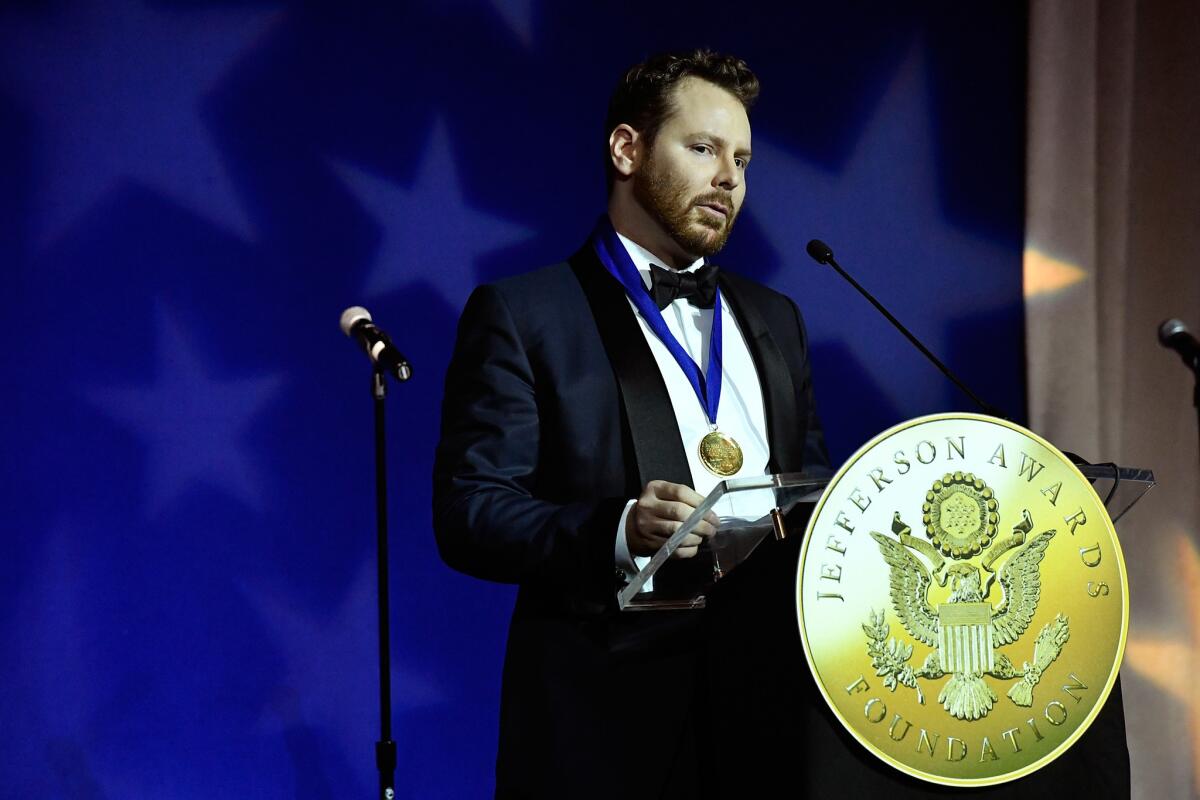Napster co-founder Sean Parker once vowed to shake up Washington — so how’s that working out?

Reporting from Washington — It was Sean Parker’s house, but it was hardly his scene.
The food station lines, rote candidate remarks and hordes of well-mannered donors chatting under a backyard tent did not scream renegade. Neither did the guest of honor, Hillary Clinton, who netted more than $1 million breezing through that June fundraiser at Parker’s Los Angeles home.
Parker is the man who terrorized the music industry with his file-sharing technology at Napster, inspired a sinister Justin Timberlake acting performance with his scheming at Facebook, and threw environmentalists into a fit with his multimillion-dollar fairy tale-themed wedding in a California redwood grove. Yet, here he was doing legwork for the old guard of politics.
The 36-year-old Silicon Valley oligarch once vowed to rattle the established order of Washington. But several years into a multiplatform, multimillion-dollar effort that seeks to transform politics through technology, campaign cash and a few big ideas, the renowned rule-breaker is finding that the rules of politics are not easily broken.
Election 2016 | Live coverage on Trail Guide | Sign up for the newsletter
Parker is a curiosity in Washington: a billionaire eager to engage in politics, but without a signature cause. His agenda is murky, and can even be contradictory. He might emerge as the anchor donor in a big campaign to rid money from politics during one election, and then take a lead in funding efforts to protect some of the most entrenched incumbents in another. His ideology defies definition.
Members of his team, several of whom were interviewed for this story (Parker declined), describe an almost quaint motivation. Allies say the billionaire’s overarching goal is a government that is more responsive to its voters, its entrepreneurs, its needy. Tech geniuses love experimentation, one GOP consultant said, and Parker sees politics as an inviting lab.
The approach, though, is very different from the one Silicon Valley typically takes with Washington, in which impatient tech entrepreneurs try to apply their fast-moving business model to the lumbering machinery of government, and often find themselves tangled inside it.
“A lot of these big-time investors come into town and have a lot of disdain for policymakers in D.C.,” said Steve Glickman, executive director the Economic Innovation Group, a think tank that Parker is funding in Washington. “Sean is interested in building relationships here. That is unique. His take is not that they should just subscribe to the Silicon Valley way of doing things.”
The behind-the-scenes coalition-building contrasts sharply with some of Parker’s headline-grabbing political spending. He was one of the most generous donors to the Mayday political action committee launched by his friend and fellow open-Internet activist Lawrence Lessig, who attracted big money and a lot of media attention to a failed bid to pack Congress with campaign finance reformers. The massive checks Parker wrote for a similarly high-profile effort to make Congress friendly to gun control also yielded unimpressive results. The $2.5 million he contributed to a popular California marijuana legalization measure came only after other billionaires before him blazed the trail on pot legalization.
Where the serial start-up investor is having the biggest impact in the political world, ironically, may just be in bolstering the status quo. His money was a big factor in keeping a Senate seat in the hands of Thad Cochran, a moderate Republican from Mississippi whose 2014 reelection bid was threatened by a tea party insurgent. He helps Republicans cozy with the Chamber of Commerce fend off tea party insurgents through another PAC. He gives generously to Democratic Party accounts. He opened his house to Clinton donors.
The pattern suggests politics is not so much a whim or calculated business move for the billionaire, but a personal project. Parker is approaching government dysfunction in the same way he is his $250-million effort to find a cure to cancer. Both are scourges of society that are complex and intractable. And in both cases, Parker is trying to work his way deep into the networks of entrenched operators and decision makers and nudge them toward alternative paths.
Much of the work takes place out of the public eye, at the Economic Innovation Group, launched last year. The obscure think tank has attracted top Washington policy talent to help develop, articulate and carry through Parker’s vision for spreading prosperity to the many American cities losing ground amid the economic recovery. Predictably, the framework focuses on policies that would draw the kind of entrepreneurship and venture investment that has enabled Silicon Valley and other innovation hubs to thrive to the places investors don’t consider.
The work is unglamorous and slow going. The team has been churning through data models, meticulously assembling and revising legislation and engaging in the humbling task of congressional coalition-building.
“He’s not one of those guys who just flies into Washington and says, ‘You need to do this, this and this,’” said Rep. Eric Swalwell, a Bay Area Democrat who was a guest at a dinner recently where Parker brainstormed with a small, bipartisan group of up-and-coming lawmakers. “He was not pushing or peddling anything. It was more, ‘Here is what I am working on’ and taking the temperature of what we thought could move in the House.”
Still, Silicon Valley bravado doesn’t disappear when the billionaire shifts focus to Washington. He is zealous in his belief that tech will drastically change the way the electorate engages, motivating millions of people who sit out politics altogether to rise up and force the kind of action on issues such as gun control and campaign finance that the progressive PACs he backed could not.
He has invested millions in a firm called Brigade, which aims to build a networking tool for voters that would be as powerful and seamless as LinkedIn is for job seekers.
“People have learned how to use Twitter and Facebook to build a movement, but the question for us was whether it is having a long-term impact,” said Michael Polansky, a longtime business partner of Parker’s. ”We wanted to take it to the next level and say, ‘How do we connect these grass-roots communities back into a meaningful system?’”
“Let’s say you care about gun control,” Polansky said. “Instead of generally recruiting all your Facebook friends, we can help you recruit people in districts that are competitive and meaningful. And when it comes time for the election, we can re-engage users who have pledged their votes for certain things, help get them to polls, and help them take positions on the ballot.”
Parker has bet on other political engagement technology, some of which has changed the face of campaigns. One firm he helped fund, NationBuilder, has become one of the most highly regarded tools for tracking and targeting voters, enabling even small-scale campaigns to run highly sophisticated outreach operations. His decade-old firm Causes helped turn online petition-gathering into a social phenomenon.
But the outlook for Brigade is murkier. It is but one of many such apps, and some veterans of digital campaigns say they are hard pressed to see how it will be a game changer, particularly with its focus on trying to connect voters with causes and candidates that might motivate them to vote.
“We’ve got 40 years of data about why and how people vote,” said Nicco Mele, director of the Shorenstein Center on Media, Politics and Public Policy at Harvard and a former Los Angeles Times executive. “The general consensus in both academia and political consulting is that information is not the problem.”
Parker built his personal brand flouting such advice. Whether his style will ultimately redefine how voters engage remains to be seen, as does whether he can redefine how well-heeled political donors engage. The only certainty seems to be that it will all move slowly.
Early in the presidential race, as the spotlight shifted to Silicon Valley and Republican candidates were tripping over one another to project a hipness to the sharing economy and embedding Silicon Valley’s values into their campaign message, Parker granted several of them an audience.
Among those he huddled with were Sens. Rand Paul and Marco Rubio and former Florida Gov. Jeb Bush. Parker had even given money to the Senate accounts of Rubio and Paul. He was sending a clear signal: Innovators like him would not be taken for granted again. Many had felt betrayed by the large financial contributions tech innovators made to President Obama, a candidate who they felt said all the right things on his visits out West but ultimately did not fully deliver for the innovation economy.
“We could have had a shot at Sean,” Charlie Black, a Republican consultant in Washington who advises Parker and other tech innovators, said of bringing him to the GOP side in the presidential race.
But those GOP politicians failed. Republican voters rallied behind Donald Trump, a candidate whose main use for Silicon Valley is to antagonize it. Parker and other unconventional donors had nowhere to turn to shake up the race.
Eventually, 500 Hillary Clinton donors would pay $2,700 each to be in his backyard.
Follow me: @evanhalper
ALSO
How Khizr and Ghazala Khan went from grieving parents to stars of the presidential race
Obama says Trump is ‘unfit to serve,’ and Trump threatens to walk away from leading Republicans
Clinton’s mission in battleground states: Lure working-class white voters away from Trump’s camp
More to Read
Get the L.A. Times Politics newsletter
Deeply reported insights into legislation, politics and policy from Sacramento, Washington and beyond. In your inbox three times per week.
You may occasionally receive promotional content from the Los Angeles Times.











